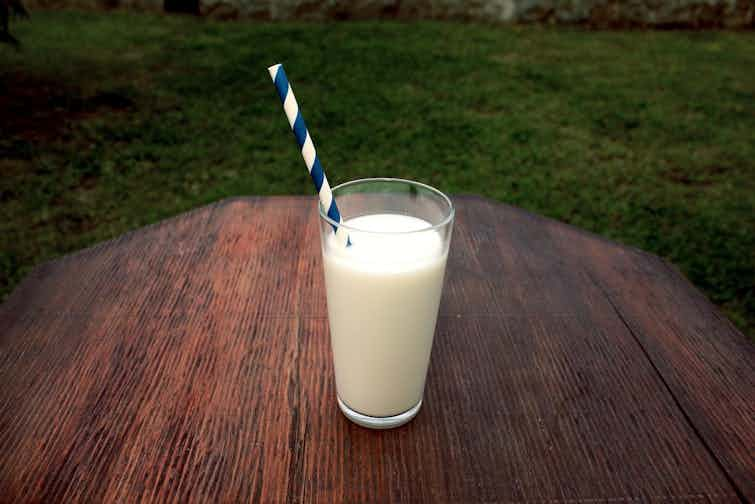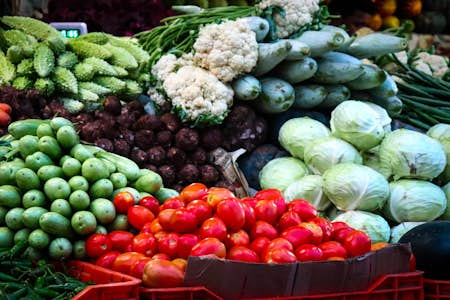Milk can help acid reflux, providing temporary heartburn relief. However, its high fat and calcium content can cause issues for some patients.
Learn about the causes, symptoms and trigger foods associated with acid reflux - and how you can use milk to help your condition.
What is acid reflux?
Acid reflux is a gastro-oesophagal reflux disease (GORD) where stomach acid leaks up the oesophagus. This condition is typically caused by a weakening of the ring of muscle at the bottom of your oesophagus. This muscle controls stomach acid, making sure it stays in your stomach.
If you struggle with acid reflux, however, acid can come back up into the oesophagus - causing GORD symptoms.
Acid reflux can be influenced by external factors such as obesity, smoking and stress. The foods you eat can also have a big effect on this gastrointestinal problem, including acidic foods like citrus fruits. For this reason, making certain lifestyle changes can help you manage mild acid reflux, such as choosing smaller meals or avoiding trigger foods.
You can also use an over-the-counter medication like antacids to manage your condition and provide immediate heartburn relief. Speak to your doctor or gastroenterologist for advice if you’re experiencing painful acid reflux symptoms.
Symptoms of acid reflux
There are a few common symptoms of acid reflux, including:
- A burning sensation in your chest (heartburn)
- Bloating
- Upper abdominal or chest pain
- Trouble swallowing or a lump in your throat
These symptoms can get particularly uncomfortable after eating a trigger food, such as fried foods. Your indigestion may also feel worse at night or when you lie down.
Acid reflux trigger foods
Although acid reflux isn’t always caused by the food you eat, it’s important to consider your diet and lifestyle choices if you have this condition.
Citrus fruits, high-fat foods and spicy foods are all common triggers for acid reflux. Fatty foods, in particular, can lead to excess acid, as the stomach takes longer to remove your stomach acid after digesting a fatty meal. This is called gastric emptying.
If you experience heartburn regularly, try to avoid these heartburn-trigger foods when you can. Everyone reacts differently to different foods, so you may need to try out a few different options before you find the right diet for you.
Does milk help acid reflux?
There are a few natural ways to help prevent acid reflux. Foods such as whole grains, ginger and boiled vegetables can help to manage your symptoms. Peppermint also has various benefits for your digestive tract - but it can exacerbate heartburn for some patients.
Some healthcare professionals recommend drinking milk to relieve heartburn during an uncomfortable flare-up. However, dairy products can also aggravate GORD symptoms - so it’s important to understand exactly how to use this food product to ease your condition.
Julie Thompson, specialist gastroenterology dietitian and information manager at Guts UK, told Health Times, "Milk's benefit in treating reflux is scientifically unknown. Some people say they experience relief, suggesting milk might create a temporary acid barrier, coating the oesophagus. Milk is calcium-rich, and beneficial for those able to drink it. Those experiencing regular heartburn or reflux, or heartburn that doesn’t react to over-the-counter medication should seek help from their GP.”
Benefits of milk for acid reflux
A glass of milk has long been considered a good natural remedy for acid reflux. Low-fat milk, such as skimmed or semi-skimmed, can act as a temporary buffer between your stomach lining and your acidic stomach contents. This provides heartburn relief for those struggling with acid reflux.
Low-fat yoghurt can also help if you experience frequent heartburn. This product contains probiotics, giving your digestive health a good boost and providing immediate relief from the symptoms of acid reflux.
Almond milk is a great alternative if you’re lactose intolerant. This milk can also neutralise stomach acid and reduce uncomfortable indigestion symptoms.
Drawbacks of milk for acid reflux
Although cow’s milk may help acid reflux, its fat content can be a concern for some patients. Whole milk can make acid reflux worse as it’s full-fat - and so it can lead to excess acid production in the stomach.
Calcium carbonate, a key ingredient found in milk, can also cause acid rebound. This is when your stomach creates even more acid, which can exacerbate heartburn symptoms.
You need to think carefully about how much milk you’re drinking if you’re struggling with acid reflux, as well as which kind of milk you choose.
Using milk to help with acid reflux
It can help to follow a dietary plan if you’re dealing with acid reflux on a regular basis - and there are a few home remedies you can try out. Drinking a glass of milk can ease your symptoms and provide a temporary barrier between your stomach lining and its acidic contents.
However, drinking too much milk - or choosing full-fat options - can lead to issues for some patients. Speak to a healthcare provider before making any changes to your diet.
Image Credit: Fá Romero at Pexels






